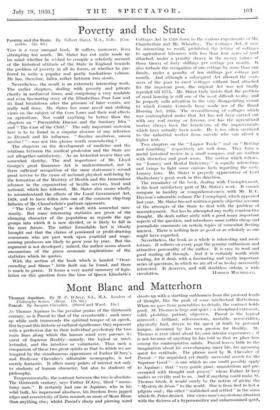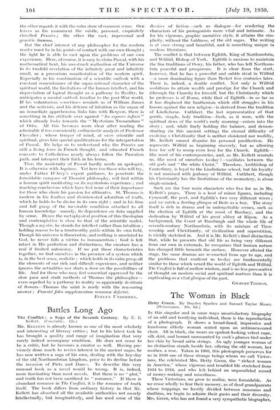Mont Blanc a nd Matterhorn
Thomas Aquinas. By M. C. D'Arey, S.J., M.A. Leaders of Philosophy Series. (Beam. 12e. 6d.) As Thomas Aquinas to the peculiar genius of the thirteenth century, so is Pascal to that of the seventeenth : each sums up while each transcends the spiritual temper of an epoch. But beyond this historic or cultural significance, they represent with a perfection due to their individual psychology the two main lines along which the human mind ever pursues its quest of Supreme Reality—namely, the logical or intel- lectualist, and the intuitive or voluntarist. Thus such a comparison of these two great spirits as that to which we are tempted by the simultaneous appearance of Father D'Arcy's and Professor Chevalier's admirable monographs, is not merely fantastic. It offers many points of interest not only to students of human character, but also to students of philosophy.
Temperamentally, the contrast between the two is absolute. The thirteenth century, says Father D'Arey, liked " moan- tainy men." It certainly had one in Aquinas, who in his solid bulk, his impersonal aloofness, his freedom from jagged edges and eccentricity of form reminds us more of Mont Blanc than anything else; whilst Pascal's sharp and piercing mind
shoots up with a startling suddenness from the pastoral levels of thought, like the peak of some intellectual Matterhorn. When we pass from generalities to details, the contrast, holds good. St. Thomas is large and quiet ; n disciplined extrovert, solid, plodding, patient, objective. Pascal is the typical introvert : brilliant, self-conscious, unstable, nerve-ridden, physically frail, drivers to the quest of truth by personal hunger, devoured by his own passion for Reality. St. Thomas is ever silent about his own interior experiences ; it is not because of anything he has told us that we place him among the contemplative saints. Pascal leaves little to the imagination about his ever-changing inner life, his agonizing quest for certitude. The phrase used by M. Chevalier of Pascal—" the anguished yet finally successful search for the Supreme Good "—is one which no one could possibly apply to Aquinas ; that " very gentle giant, unambitious and pre- Occupied with thought and prayer," whom Father D'Arey makes so vividly real to us. And if anything could make St. Thomas blush, it would surely be the notion of giving the '• Mystere de .Msus " to the world. One is from first to lust a pilgrim soul ; the other " stablished and settled" in the sense which St. Peter desired. One views man's mysterious situation with the distress of a hypersensitive and unharmonized
the other regards it with the calm stare of common sense. One leaves us his monument the subtle, personal, exquisitely chiselled Pensies ; the other the vast, impersonal and granitic &alma.
But the chief interest of any philosopher for the modern reader must be in his points of contact with our own thought ; the light he is able to cast upon the problems of our own experience. Here, of course, it is easy to claim Pascal, with his mathematical bent, his awestruck realization of the Universe in its twofold revelation of the infinitely great and infinitely small, as a precocious manifestation of the modern spirit. Especially in his combination of a scientific outlook with a constant remembrance of the supra-rational character of the spiritual world, the limitations of the human intellect, and his depreciation of logical thought as a pathway to Reality, he anticipates a mental outlook familiar to the post-War world. If his voluntarism sometimes reminds us of William James and the activists, and his defence of intuition as the organ of an immediate apprehension links him with Bergson, there is something in his attitude over against " les espaces infinis" which already looks towards the " Mysterium Tremendum " of Otto. All this becomes more clear after reading the admirable if too consistently enthusiastic analysis of Professor Chevalier ; whose temper of mind, at once scientific and spiritual, gives him special qualifications for the interpretation of Pascal. He helps us to understand why the Peasecs are still a living force in French thought, and educated French converts to Catholicism nearly always follow the Pascalian path, and interpret their faith in his terms.
Thus the modernity of Pascal hardly needs an apologist. It is otherwise with Aquinas. Yet here too those who will try, under Father D'Arey's expert guidance, to penetrate the formidable carapace of Thomist philosophy, will find within a human spirit meditating on its mysterious experience ; and reaching conclusions which have lost none of their importance for those who share iris passion for ultimates. St. Thomas is modern in his fearless and disinterested adoration of truth, which he holds to be divine in its own right ; and in his firm and full grasp of the inevitable condition attached to all human knowledge—namely, its dependence on data supplied by sense. Hence the metaphysical position of this theologian and contemplative- is close to that of the scientific realist Though a mystic, he stands for intellect rather than intuition ; holding reason to be a trustworthy guide within its own field. Though his universe is theocentric, and nothing is unrelated to Cod, he never falls a victim to immanentism ; God is left intact in His perfection and distinctness, the creature has a real if limited autonomy. If we put these. characteristics together, we find ourselves in the presence of a system which is, in the best sense, realistic ; which holds in its calm grasp all the elements of our rich and difficult experience, and neither ignores the actualities nor shuts a door on the possibilities of life. And for those who may feel somewhat oppressed by the slow pace and stark methods of Thomas the philosopher— even repelled by a pathway to reality so apparently destitute of flowers—Thomas the saint is ready with the reassuring answer : Praestet fides supplententunt sensuum defectui.
EVELYN UNDERHILL.

















































 Previous page
Previous page